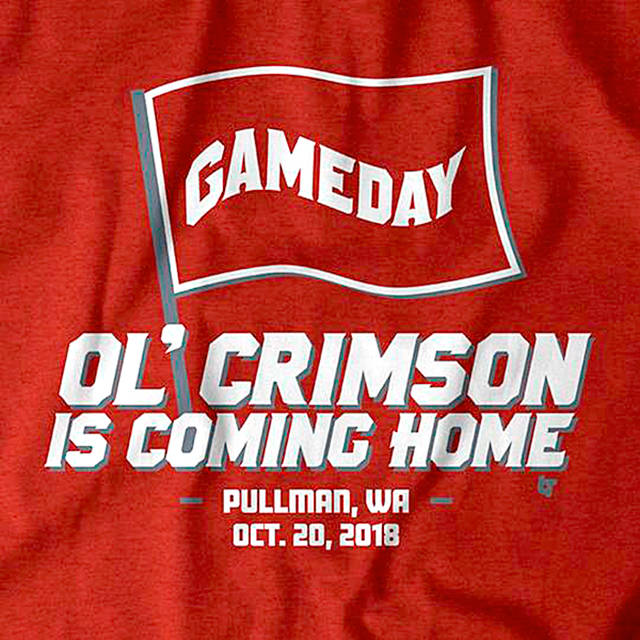A 15-YEAR, nationwide odyssey ends at 6 a.m. Saturday when ESPN’s mainstay of a college football preview show, College GameDay, broadcasts from the rolling hills of the Palouse on the campus of my alma mater, Washington State University in Pullman.
Martin Stadium will be the backdrop as the collective Cougar family is rewarded for its dedication in waving the Ol’ Crimson flag at every taping of the show since October of 2003 — a remarkable 216-game streak.
Washington State fans have waving the flag down to a science by now. There’s even an operations manual with tips and hints on how to best find the show’s cameras for maximum Cougar flag coverage.
Volunteer flag wavers have made sure the Washington State logo was flying proudly above the show’s set at 10 appearances apiece at storied programs such as Ohio State, USC and Alabama.
No. 12 Oregon, the Cougars’ opponent in a crucial Pac-12 North Division matchup at 4:30 p.m. Saturday, has hosted the show nine times and the rival Washington Huskies have had the show set up on Red Square twice, most recently in 2013.
GameDay even made it to a Division III matchup at Williams College and FCS powerhouses North Dakota State and James Madison.
15 years in the making
When the idea was hatched by WSU grad Tom Pounds that if GameDay wouldn’t go to WSU, WSU would go to GameDay, the Cougars were riding relatively high in the college football landscape — coming off a Pac-12 title and Rose Bowl appearance and in the third of three straight 10-win seasons.
Then the wheels fell off for the better part of a decade and it felt like the Washington State fan base would be left to wander the college football wastelands forever.
Or even more than a football program that has an under-.500 record all-time and the smallest athletics budget in the Pac-12 and at any Power 5 conference school.
The announcement of GameDay comes with the Cougs 5-1 and ranked No. 25 in the latest Associated Press poll. Students, alumni and fans have responded in earnest since the show’s Kirk Herbstreit announced GameDay’s appearance in Pullman last Saturday.
Thousands of fans are expected to converge on the GameDay set in the dark early Saturday morning. I’ve even heard of a friend flying in from Minneapolis just to attend. The game itself is sold out and the athletic department is holding a first-of-its-kind home game viewing party in the basketball arena for the expected overflow crowds.
The Pullman City Council even declared a State of Emergency in a vote Tuesday night, mainly to allow the use of Pullman Transit busses to ferry the crowds around the hilly community.
And truthfully, Washington State supporters needed this show of affection.
The last 10 months have seen the death of beloved Washington State graduate and legendary sports broadcaster Keith Jackson; the suicide death of presumptive 2018 starting quarterback Tyler Hilinski at his off-campus apartment and the resignation of former Cougar QB Jason Gesser from his athletic fundraising position in the wake of sexual harrassment allegations by a former Washington State volleyball player and others.
Hilinski’s passing shattered the myth of the hero athlete and was incomprehensible to many who had seen the 21-year old lifted up and carried off the Martin Stadium turf after coming on in relief and leading WSU to an improbable comeback win over Boise State last season.
Mayo Clinic doctors examined Hilinski’s brain and found he had the pathology of chronic traumatic encephalopathy (CTE), which can manifest itself in depression.
A June Sports Illustrated story on Hilinski, mentioned that a doctor told Hilinski’s mom Kym, that Tyler’s brain looked “like that of a much older, elderly man.”
The school initially handled his death as well as can be expected in tragic circumstances — a student-led vigil at the Cougar Pride statute had me in tears in late January — but WSU took some heat for moving the focus away from memorializing Hilinski and toward the overarching goal of suicide prevention during the team’s home opener in September.
The athletic department’s investigation of Gesser, unearthed by student journalists at the school’s Daily Evergreen newspaper, brought Washington State into the eye of the #MeToo movement and will hopefully allow Alyssa Wold, the former WSU athlete and babysitter for the Gesser family who filed a formal complaint against Gesser with the school last month, an opportunity to heal and reconnect with her alma mater.
GameDay offers a chance to highlight the university, to spotlight why it is that thousands of college-age students choose to live and study together in a tiny Eastern Washington town for nine months of the year and how such a tight bond develops between a school and a fanbase.
WSU isn’t for everyone, but the school is vitally important to anyone who’s trudged up and down those hills, sat in those classrooms and studied (or watched football practice) in Holland Library.
Welcome to town and don’t take so long in making your way back. Go Cougs.

